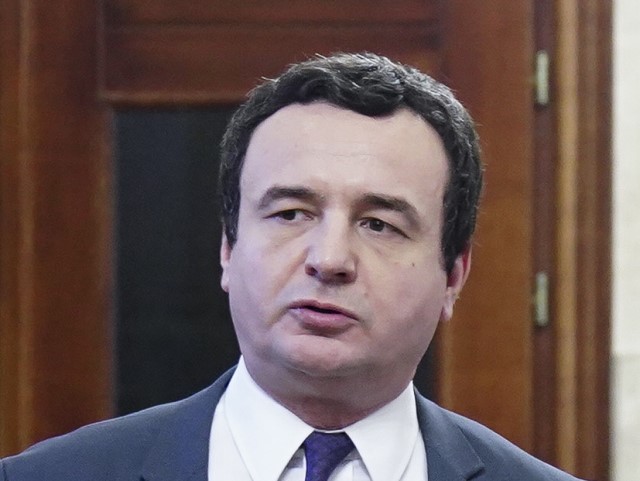Serbia’s top diplomat, Foreign Affairs Minister Marko Đurić, sent a letter to a Democrat-affiliated organization this week expressing “deep concern and disappointment” over the presence of Kosovar Prime Minister Albin Kurti at the Democratic National Convention (DNC).
Kurti attended the convention this week and participated in a panel on the sidelines hosted by the National Democratic Institute (NDI), a non-governmental organization (NGO) that describes itself as having a “loose affiliation with the Democratic Party.” Joining Kurti on the panel were longtime Democratic commentator Donna Brazile and former Sen. Tom Daschle (D-SD).
Kosovo declared independence from Serbia in 2008 and has still not received formal recognition as a state from Belgrade. Ethnic tensions between Serbs and Albanians in the region have simmered for decades and recently worsened during the term of leftist American President Joe Biden, who has not prioritized relationships in the region, leading to riots by ethnic Serbs in Kosovo and brawls in the Kosovar Assembly, the national legislature.
President Donald Trump, in contrast, invested significant diplomatic energy into reducing violence and discord in the region. His work there earned him one of several nominations for the Nobel Peace Prize.
Kurti has used his time in Chicago, currently hosting the DNC, to meet with members of the ethnic Albanian community there and some lawmakers. The prime minister highlighted a talk with Rep. Jim McGovern (D-MA) in which he thanked the lawmaker for a “warm and positive meeting” in which he shared Kosovo’s “strong democratic and economic progress during our Government’s mandate over the past three and a half years.”
Kurti described the NDI panel as delivering a “fruitful discussion on the best lessons we’ve learned from leading and being part of political parties.”
Đurić, the Serbian foreign affairs minister, wrote a letter to the NDI reportedly arguing that Kurti did not deserve a warm welcome from Democrats as he had allegedly worked against American interests in eastern Europe. Đurić accused Kurti of human rights violations, a translation of the content of the letter by the news site Kosovo Online indicated, and claimed he “repeatedly engaged in practices undermining U.S. interests and presence in the Western Balkans.”
The letter reportedly read:
Let me remind you that these destabilizing activities, including repeatedly walking away from the dialogue process between Belgrade and Pristina and refusing to align with Washington, have been strongly condemned by senior officials and representatives in both the U.S. and the EU.
“What is even more concerning is the fact that Albin Kurti,” he reportedly continued, “despite consistently undermining U.S. policy in the Western Balkans and proving to be an unreliable American partner, appears to be using the DNC as a podium to launch his election campaign, exploiting it for the interests of his party.”
The left-wing Serbian newspaper Danas reported that Đurić later commented on Kurti’s presence in Chicago on Serbian television, lamenting the “wrong signal” Democrats were sending that “directly acts not only against Serbian interests, but also against the politics of Washington.”
Danas highlighted critical voices within Serbia who condemned Đurić’s letter as inappropriate, as the NDI is not a sovereign state entity and Democrats have on occasion also invited Serbian government officials to their events.
The NDI apparently took the letter seriously, as Đurić revealed on Wednesday that he held a phone call with the president of the NGO following his communication to it.
“The cooperation between Serbia and NDI is very significant in many segments and has been going on for years. It will continue in the future,” Đurić reportedly said, according to the Serbian newspaper Politika. “Serbia also has other representatives at the Democratic National Convention, and in that conversation I presented our point of view and our position, presented the reasons why I think his [Kurti’s] participation in such gatherings is not a good idea,”
Kurti’s invitation to the DNC received some criticism from the American right, as well. Former President Donald Trump’s Acting Intelligence Director Richard Grenell, who spent much of his time in the administration working on reducing tensions in the Balkans, described Kurti as “reckless” for siding with Democrats in a domestic partisan event, but condemned Kurti separately for damaging efforts to make the region more peaceful.
“He’s also been condemned by NATO, the EU, Germany, France, the Trump Administration and the Biden Administration for unilaterally making the region unstable,” Grenell wrote on social media of Kurti. “For the leader of Kosovo to openly choose the Democrats is a reckless move on Kurti’s part. Apart from interfering in the U.S. elections, his move to support Kamala Harris at the Democrat Convention harms the people of Kosovo.”
The Trump administration’s efforts in Serbia and Kosovo did not fully resolve Serbia’s resistance to recognizing Kosovo’s sovereignty, but did aid in helping both governments navigate how to share certain disputed resources. At the top of that list is a lake straddling the border of both countries whose name Belgrade and Pristina disputed. Kosovars traditionally referred to the lake as Ujman, while Serbs called it “Gazivoda,” but in 2020, a banner appeared over the lake reading “Lake Trump.”
Both governments confirmed that they were willing to keep the new name and it was not a joke or a prank.
The Trump administration also brokered the establishment of diplomatic relations between Kosovo, a majority Muslim country, and Israel.
In 2020, Swedish lawmaker Magnus Jacobson nominated Trump’s government for the Nobel Peace Prize for its work in the region.
“I have nominated the US Gov. and the governments of Kosovo and Serbia for the Nobel Peace Prize for their joint work for peace and economic development, through the cooperation agreement signed in the White House,” Jacobson announced. “Trade and communications are important building blocks for peace.”
